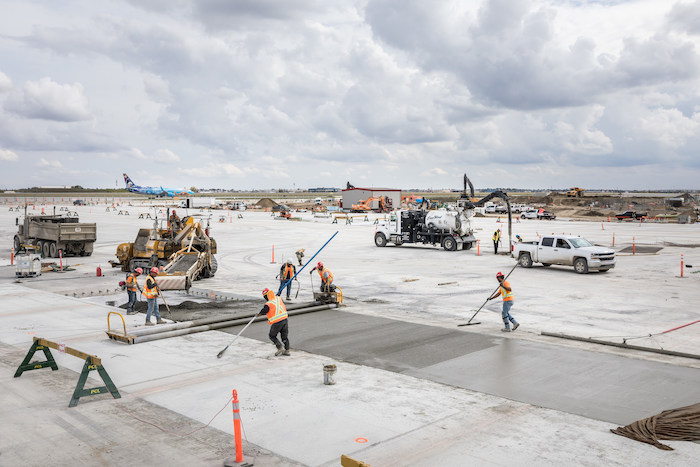
Reducing carbon with YYC’s East Deicing Apron
May 3, 2020
By CCE
For the first Canadian project of its kind, concrete was injected with waste carbon during mixing.

Photo credit: CarbonCure Technologies.
In August and September 2019, CarbonCure Technologies installed a new deicing pad for YYC Calgary International Airport. The first of its kind in Canada, the East Deicing Apron was built with reduced-carbon concrete. PCL was the contractor for the project and the concrete was produced at an on-site portable batch plant.
“As YYC strives to be a leader in airport sustainability, we fully supported our airline partners in the decision to inject captured carbon into the new East Deicing Apron’s concrete pavement,” says Carmelle Hunka, general counsel and vice-president (VP) of risk and compliance for the Calgary Airport Authority, which operates YYC.
The amount of concrete poured to build the pad—approximately 25,300 m3—represents the second-largest pour of CarbonCure concrete in a single project and the largest quantity to be used in Canada. It is estimated to reduce 160 tonnes of carbon, equivalent to the carbon dioxide (CO2) absorbed by 209 acres of forest over the course of a year. The only larger project of its kind so far has been an office tower at 725 Ponce in Atlanta, Ga., where 33,000 m3 of the concrete was used.
The company injects waste CO2, captured by industrial gas suppliers, into its concrete during mixing. The resulting product is not just more sustainable than typical concrete—with each 1 m3 reducing an average of 16 kg of carbon emissions, meaning an average high-rise building could save 120 tonnes of emissions—but also reportedly stronger.
CarbonCure reports its partners’ total concrete production volume in 2019 surpassed 3.3 million m3, reducing CO2 emissions by more than 55,000 tonnes, equivalent to that absorbed by more than 70,000 acres of forest or, to think of it another way, taking 12,000 cars off the road for the year.
“2019 was a record year, as our partners’ total production volume and the associated carbon savings nearly doubled from 2018,” says Robert Niven, the company’s founder and CEO. “We are proud a project based in Canada was such a large contributor to these milestones. This is another instance of CarbonCure meeting rigorous performance standards, including the top-tier design and engineering standards required for airport paving.”
The first airplanes to use YYC’s new deciding pad began to do so in December.